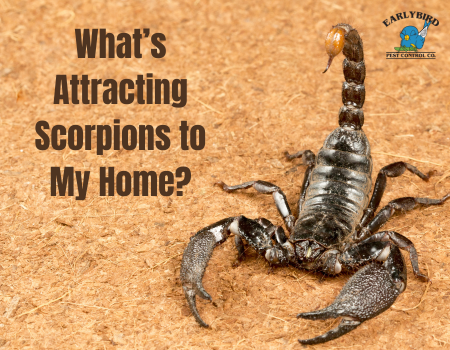If you live in the Southwest, especially in states like Arizona, New Mexico, Nevada, or Texas, encountering scorpions is an unfortunate reality of desert living. These nocturnal predators often venture into residential areas, and when they do, homeowners are left wondering: what’s attracting scorpions to my home?
The truth is, scorpions don’t randomly wander indoors — your home may be unintentionally providing exactly what they’re looking for. Here’s what might be drawing them in and what you can do to make your property less inviting.
Why Are Scorpions a Problem?
Most scorpions aren’t aggressive toward humans, and many species deliver stings comparable to a bee. However, in places like Arizona, the bark scorpion — the most venomous in North America — can cause serious symptoms, especially in children, older adults, or pets.
Even if they aren’t life-threatening, no one wants to find one hiding in their shoes, sink, or bed. Understanding what attracts scorpions is the first step to keeping them out.
1. Food Sources
Like any predator, scorpions follow the food. They prey on insects, spiders, centipedes, and even small lizards. If your home or yard harbors a steady supply of bugs, scorpions won’t be far behind.
Common pest attractions include:
- Crickets and cockroaches
- Ants and beetles
- Moths and other flying insects
- Spiders nesting around your home
What to do:
Maintain regular pest control, seal food sources, and limit outdoor lighting at night, which attracts insects and, in turn, the scorpions that hunt them.
2. Water and Moisture
Like many desert creatures, scorpions are drawn to water, especially during dry spells. Leaky pipes, pet water bowls, irrigation systems, and damp basements or bathrooms provide the moisture they seek.
Common moisture sources:
- Dripping outdoor faucets and garden hoses
- Overwatered landscaping
- Condensation under appliances
- Leaky pipes beneath sinks
- Poor drainage areas around the foundation
What to do:
Repair leaks promptly, empty standing water, use dehumidifiers in damp areas, and maintain proper yard drainage.
3. Shelter and Hiding Spots
Scorpions are nocturnal and prefer dark, sheltered areas during the day. Your home and yard can offer plenty of ideal hiding places, both indoors and out.
Popular hiding spots include:
- Piles of firewood, rocks, or bricks
- Unkempt landscaping with dense ground cover
- Cluttered garages, sheds, and storage areas
- Cracks and gaps in walls, doors, and windows
- Inside shoes, laundry, and under furniture
What to do:
Keep your yard tidy, store firewood away from the house, seal cracks and openings, and reduce clutter indoors.
4. Openings and Entry Points
Scorpions are skilled at squeezing through surprisingly small gaps — sometimes as narrow as 1/16 of an inch. If your home has unsealed entry points, they can easily make their way inside.
Common entryways include:
- Gaps beneath doors
- Cracks in walls and foundations
- Openings around utility lines
- Vents without screens
- Unsealed windows or window frames
What to do:
Install weather stripping, repair screens, seal foundation cracks, and use door sweeps to close off entry points.
5. Ideal Outdoor Conditions
Certain landscaping features and yard conditions naturally attract scorpions, especially if your outdoor environment provides cool, shaded areas during the heat of the day.
Attractive yard conditions:
- Dense vegetation or overgrown shrubs
- Rock gardens and decorative boulders
- Woodpiles, debris, and compost piles
- Stacked roof tiles or bricks
What to do:
Trim back plants and shrubs, clear away debris, and avoid placing large rocks or woodpiles close to your home’s foundation.
How to Keep Scorpions Away
In addition to eliminating attractions, here are a few extra precautions:
- Hire professional pest control for routine inspections and treatments.
- Use glue traps in dark corners, garages, and under furniture.
- Keep outdoor lighting minimal or use yellow bug lights.
- Shake out shoes, towels, and bedding, especially if left near the floor.
- Keep your home’s perimeter clear of debris and woodpiles.
Scorpions typically invade homes in search of food, water, shelter, and cool hiding places. If your home or yard offers any of these, it can quickly become a hotspot for scorpion activity — especially in desert climates like Arizona.
By controlling insects, reducing moisture, sealing entry points, and minimizing outdoor hiding spots, you can make your home far less appealing to scorpions. For recurring issues, working with a pest control professional is often the most effective long-term solution.


Recent Comments